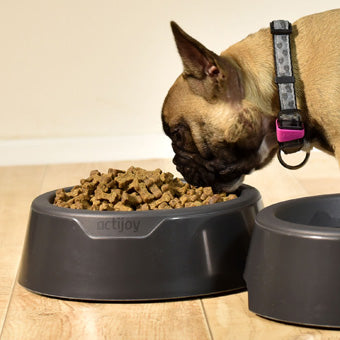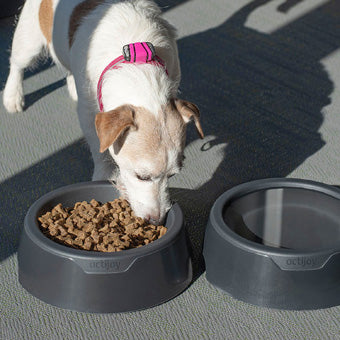The Consequences of Dog Obesity
Learn more about reasons, why your dog may be obese. Find out what breed is more prone to being obese and what are the avoidable consequences of dog obesity.

Dogs are very dear pets to us, and we sometimes tend to spoil them, although some forms of spoiling your pet are acceptable, some are not. Making your dog lazy and feeding them excessively is a thing that must be avoided as much as possible. Obesity is a problem that dogs can have as much as humans if proper diet and exercise are not maintained. Dog obesity is a problem that can affect the long-term health of your dog and give themproblems that can be easily avoided.
Dogs that have excessive amounts of fat on their bodies are considered obese; this excessive fat is detrimental to otherwise healthy animals. Obesity is quite a common problem among pets. Although in its self-obesity is not that big problem, but it can lead to several other dangerous medical conditions in your dog. An obese dog is more prone to blood pressure disease, and heart-related problems. A very obese pet can have congestive heart failure, but the most common problem arising from obesity in dogs is diabetes a dangerous disease in itself.
There are several causes of obesity in dogs. The biggest reason dogs are obese is that dog owners allow their pets to lead a slow life with very little physical exercise. This, in turn, causes an accumulation of fats around the organs of an animal. Another reason for obesity is a slow metabolism in dogs, metabolism disorders can cause a dog to be obese and if the cause of obesity is metabolism it should be diagnosed and treated properly and this is where Actijoy comes in with a great solution to help solve your pet's obesity. For monitoring your dog's daily activity you can use the Actijoy Health & Activity Tracker and the Actijoy App, where you can set daily goals and collate Tracker data
One of the biggest causes of dog obesity is commercial foods made of grain that are rich in carbohydrates, causing your dog to retain fat and become obese. Some other diseases can also cause your dog to become obese for example if your pet is suffering from arthritis their physical activity is limited due to the disease and thus due to lack of proper exercise the dog can become obese. Recent research has also shown that some breeds of dogs like spaniels and Labradors are more prone to being obese because of their genetic traits and larger appetites.
Consequences of Dog Obesity
- Breathing and Heart Problems
Obese dogs can have more trouble breathing or worsen a pre-existing condition like collapsing trachea or laryngeal paralysis. Remember the COPD commercial with the elephant sitting on the person's chest? This is how excess weight can make our dogs feel. Obesity can also make the heart work harder.
- Subclinical Conditions
Subclinical conditions? What does that mean? Overweight dogs, like people, are more prone to inflammation in the body, high cholesterol, and high lipids, all of which can lead to pancreatitis, diabetes, gastrointestinal disease, etc. These problems can be brewing under the radar for years. Getting the weight off an obese pet can ward off chronic, often difficult to diagnose, conditions.
- Tumors
Obesity may increase the risk of certain tumors such as benign fatty tumors (lipomas), as well as breast and bladder cancer (transitional cell carcinoma).
- Quantity and quality of life
- Anesthesia risk
The heart and lungs of overweight and obese dogs have to work harder during anesthesia. Dogs struggle to breathe because they have difficulty expanding their chests. Dogs often sleep too deeply or not deeply enough. Besides, overweight dogs may take a long time to wake up after anesthesia.
- Arthritis
Extra weight puts extra pressure on a dog's joints. The cartilage in the joint deteriorates, which leads to arthritis. Sure, we can give pain medications, but weight loss helps significantly.
- Reproductive problems
Overweight dogs tend to have more problems giving birth than dogs at their optimum weight. This difficult birthing is called dystocia. Dogs experiencing dystocia often need veterinary assistance to deliver their pups and may require a cesarean section (C-section).
- Digestive disorders
An overweight dog has an increased risk of developing constipation and may also have more problems with intestinal gas and flatulence, which is not pleasant for the dog or the owner.
- Heat intolerance
Fat is an excellent insulator, which is fine if you are a polar bear. But if you are an overweight dog in the hear of summer, the excess fat can make you miserable, and much less capable of regulating your body temperature.
- Decreased liver function
The liver stores fat so when a dog is overweight, an increased amount of fat builds up in the liver. This is called hepatic lipidosis. This condition can result in decreased liver function.
The Actijoy solution can help prevent obesity and alert you to the warning signs of potential obesity in your dog.











